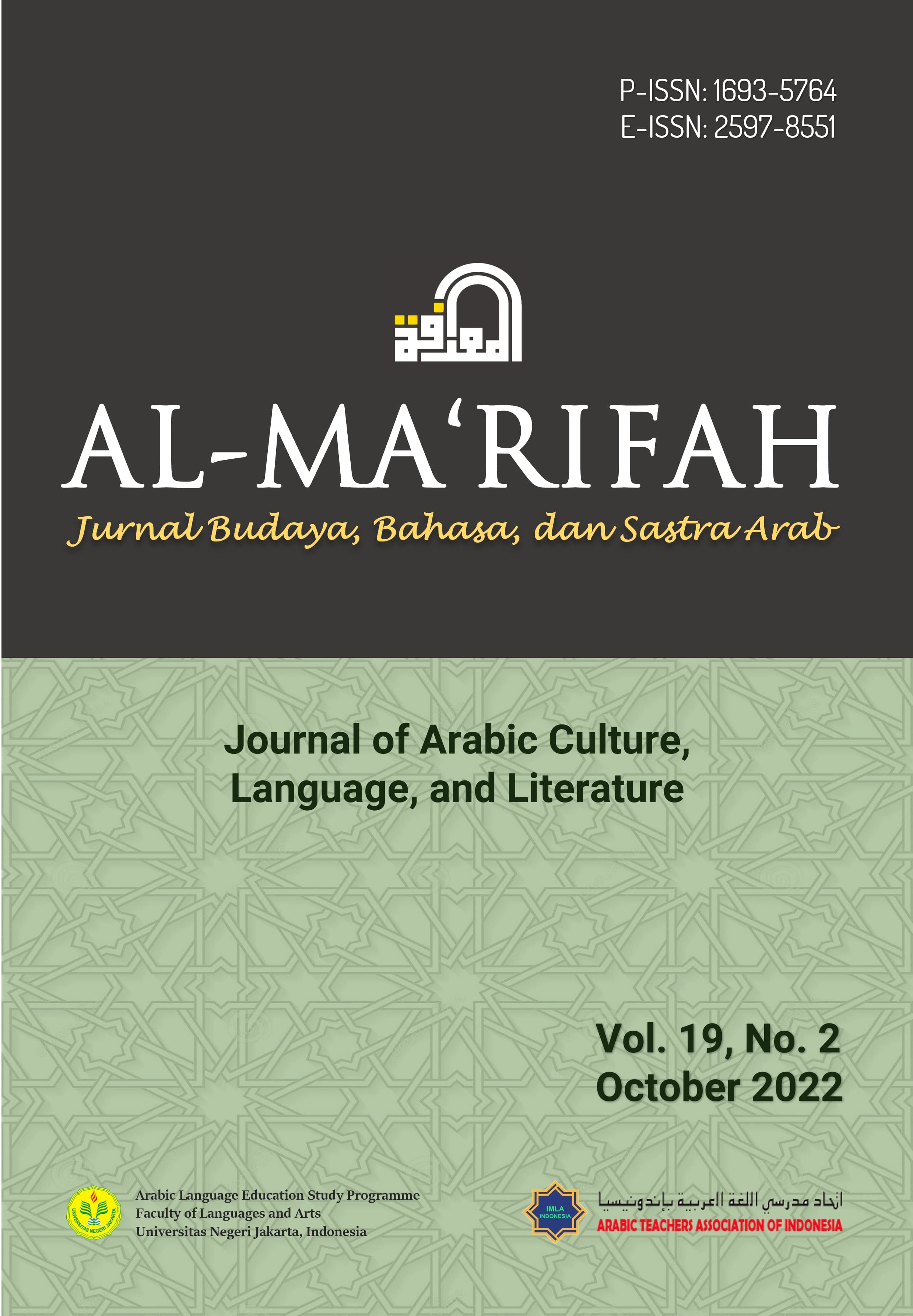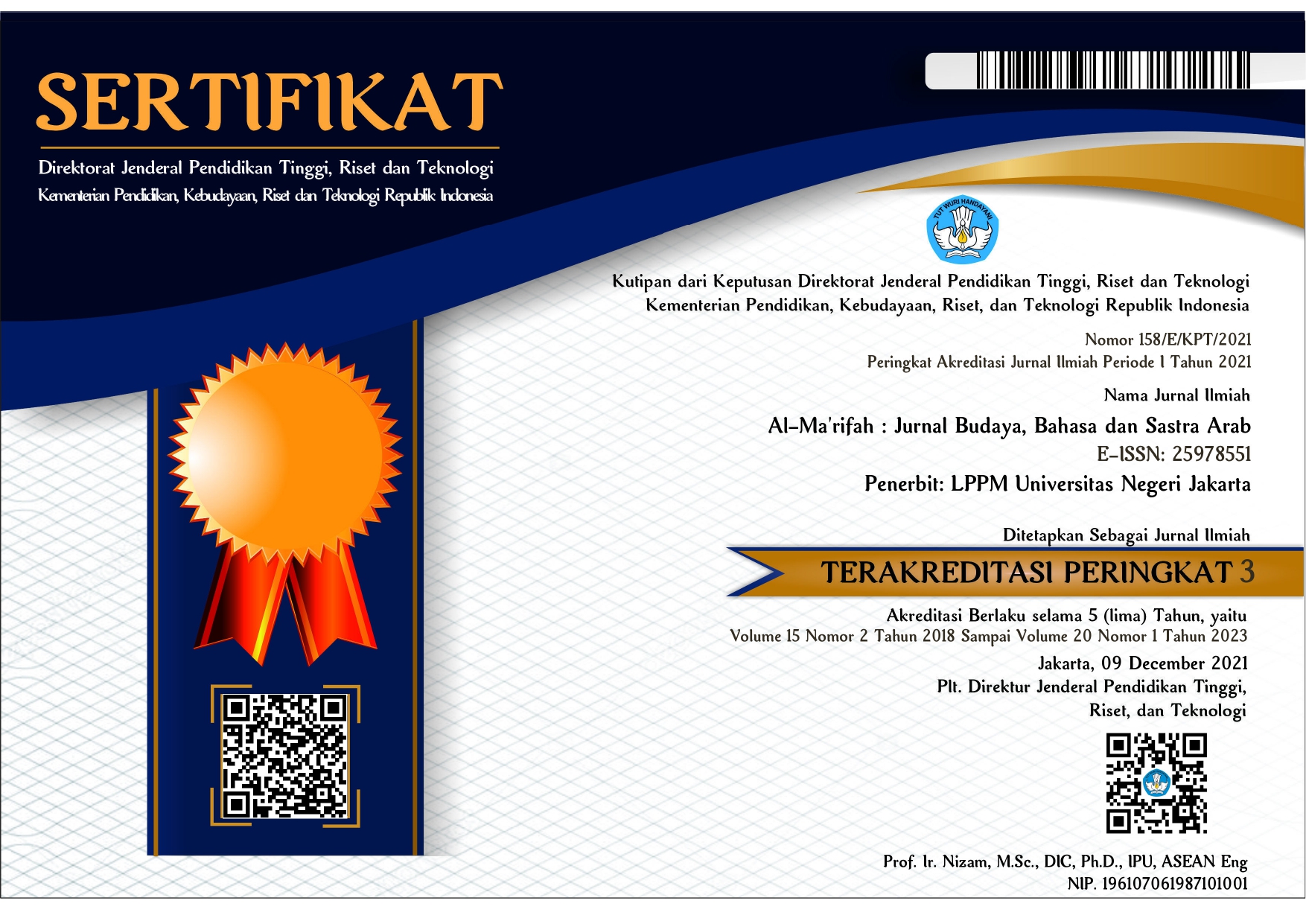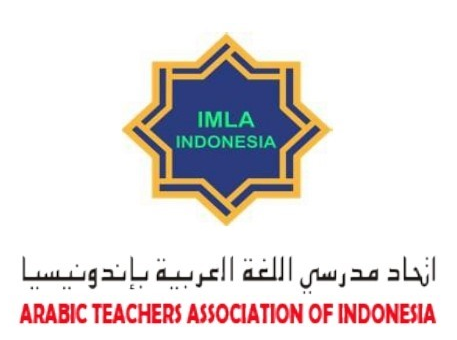Exploring Spirituality of Sa‘dūn al-Majnūn’s Poetry: A Perspective of Ibn ‘Arabī’s Hermeneutics
DOI:
https://doi.org/10.21009/almakrifah.19.02.02Keywords:
Spirituality poetry, the nature of death, the nature of ma‘rifah, Sa‘dūn al-MajnūnAbstract
Spirituality poetry generally contains elements of beauty and aesthetics, so it tends to display linguistics and literature. Sa‘dūn’s poetry has its uniqueness with spiritual content in it. Spirituality in Sa‘dūn’s poetry describes the close relationship between man and God, which is reflected in the form of criticism of society. Therefore, this study aims to determine the form of spirituality in Sa‘dūn’s poetry. This research method uses content analysis by using Ibn ‘Arabī’s hermeneutics approach in its interpretation. The results of this study indicate two things, namely: (1) essence of death in the first poem contains three important pieces of advice, namely life in this world, life in the afterlife, and prepare for death; and (2) essence of ma‘rifah contained in the second Sa‘dūn’s poetry shows Sa‘dūn’s closeness to God as evidenced by two things, namely zuhud and world prevents towards Allah. This study is important in expanding the study of Ibn ‘Arabi’s hermeneutics which is usually only used to interpret the inner meaning in the Qur’ān and ḥadīth. Hermeneutics can also be used in other literary works such as poetry, novels, short stories, etc.
References
Abandah, G. A., Khedher, M. Z., Abdel-Majeed, M. R., Mansour, H. M., Hulliel, S. F., & Bisharat, L. M. (2022). Classifying and diacritizing Arabic poems using deep recurrent neural networks. Journal of King Saud University - Computer and Information Sciences, 34(6, Part B), 3775–3788. doi:10.1016/j.jksuci.2020.12.002
Abū Zayd, N. Ḥ. (1983). Falsafat al-ta’wīl: Dirasah fī ta’wīl al-Quran ‘inda Muḥyi al-Dīn Ibn ‘Arabī. Beirut: Dār al-Waḥdah li-al-Ṭibā‘ah wa-al-Nashr.
Anjarsari, R., & Sayuti, S. A. (2019). Love in poetic expression: The poems of Abdul Wachid BS through Ricoeurian hermeneutical. Proceedings of the International Conference on Interdisciplinary Language, Literature and Education (ICILLE 2018) (pp. 314–319). Yogyakarta, Indonesia. doi:10.2991/icille-18.2019.65
Arif, S. (2014). Filsafat Islam antara tradisi dan kontroversi. Tsaqofah, 10(2), 1–22. doi:10.21111/tsaqafah.v10i1.61
Athaya, A., & Soedarsono, D. K. (2019). Pesan kegagalan dalam novel Marchella F.P melalui hermeneutika interpretasi Paul Ricouer. Jurnal Ilmiah Komunikasi Makna, 7(2), 23–29. doi:10.30659/jikm.7.2.23-29
Atjeh, A. (1976). Wasiat Ibn Arabi: Kupasan hakekat dan ma’rifat dalam tasawwuf Islam. Jakarta: Lembaga Penyelidikan Islam.
Awalia, A. R., Rasyid, Y., & Zuriyati. (2019). Nilai-nilai religius dalam kumpulan puisi Tadarus karya K.H. Ahmad Mustofa Bisri. Indonesian Language Education and Literature, 5(1), 86–98. doi:10.24235/ileal.v5i1.4164
Badriyah, D. U. Rr., Sugiharto, & Rustono. (2020). Guidance and counseling: Dwijendra’s ethical spiritual value. In F. Ahmadi, D. R. Indriyati, & V. A. Kristianto (Eds.). Digital transformation in science, technology, and education for sustainable human quality development. Proceedings of the 5th International Conference on Science, Education and Technology (ISET 2019). (pp. 225–228). Semarang, Central Java, Indonesia. doi:10.2991/assehr.k.200620.044
Bagir, H. (2015). Semesta cinta: Pengantar kepada pemikiran Ibn ‘Arabi. Bandung: Mizan.
Baharudin, M. (2015). Eksistensi Tuhan dalam pandangan ateisme. Wahana Akademika, 2(1), 95–113. doi:10.21580/wa.v2i1.824
Borisova, E., & Klimenko, E. (2018). The song cycle: Hermeneutic and communication approaches. Proceedings of the 2nd International Conference on Culture, Education and Economic Development of Modern Society (ICCESE 2018) (pp. 693–697). Moscow, Russia. doi:10.2991/iccese-18.2018.14
Chittick, W. C. (1989). The sufi path of knowledge: Ibn al-‘Arabi’s metaphysics of imagination. New York: State University of New York Press.
Endraswara, S. (2011). Metodologi penelitian sastra bandingan. Yogyakarta: CAPS.
Goldziher, I. (1955). Madhāhib al-tafsīr al-Islāmī. (‘A. Ḥ. al-Najjār, Trans.). Cairo: Maktabat al-Khānjá.
Hamzah, M., & Barrunnawa, M. (2021). Representasi keresahan Mahmoud Darwish dalam puisi al-Sijn: Kajian semiotik Riffaterre. Al-Ma‘rifah: Jurnal Budaya, Bahasa, dan Sastra Arab, 18(1), 27–38. doi:10.21009/almakrifah.18.01.03
Haque, A., Maimunah, I., & Wargadinata, W. (2021). Ibnu Zaydūn wa taqālīd asy-syi’ri al-Andalusī. Alsuniyat: Jurnal Penelitian Bahasa, Sastra, dan Budaya Arab, 4(2), 129–150. doi:10.17509/alsuniyat.v4i2.38724
Ibn ‘Arabī. (1967). Futūḥāt al-Makkīyah. Toronto: Universitas Toronto.
Ibn al-Jawzī. (1978). Ṣifat al-ṣafwah. Beirut: Dār Ibn Ḥazm.
Janah, M., & Yasir, M. (2019). Hermeneutika tauhid; Kritik terhadap penafsiran Amina Wadud tentang nusyuz. An-Nida’, 43(2), 194–218. doi:10.24014/an-nida.v43i2.12327
Kurniawan, R. M. I. (2021). Pengaplikasian teori hermeneutika Hans-Georg Gadamer terhadap hadis Nabi Muhammad. Universum, 15(1). Retrieved from https://jurnal.iainkediri.ac.id/index.php/universum/article/view/3799
Marlewicz, H. (2018). The religious hermeneutics of Gerhard Oberhammer and the investigation of the philosophical traditions of India. Proceedings of the 3rd International Conference on Contemporary Education, Social Sciences and Humanities (ICCESSH 2018) (pp. 1451–1454). Moscow, Russia. doi:10.2991/iccessh-18.2018.316
Miles, M. B., & Huberman, A. M. (2013). Qualitative data analysis: A methods sourcebook. London: Sage Publication.
Miswar. (2017). Maqamat: Tahapan yang harus ditempuh dalam proses bertasawuf. Jurnal Ansiru PAI: Jurnal Pengembangan Profesi Guru Pendidikan Agama Islam, 1(2), 8–19. doi:10.30821/ansiru.v1i2.1219.g992
Muda, L., & Kadirun. (2019). Nilai moral dalam terjemahan syair Ajonga Yinda Malusa karya Syekh Haji Abdul Ganiu: Suatu pendekatan Hermeneutika. Dialektika, 6(2), 199–216. doi:10.15408/dialektika.v6i2.13253
Mustakim, A. H. (2014). Membangkitkan spiritualitas dan memposisikan puisi sebagai obat jiwa; Kajian psikologi spiritual puisi Shobir Poer. Wanastra: Jurnal Bahasa dan Sastra, 6(2), 1–10. https://ejournal.bsi.ac.id/ejurnal/index.php/wanastra/article/view/3828
Muyassarah, & Abadi, J. (2021). Klasifikasi puisi Arab Jahiliyah menurut Ibn Qutaybah dalam kitab al-Shi’r wa-al-Shu‘arā.’ Al-Ma‘rifah: Jurnal Budaya, Bahasa, dan Sastra Arab, 18(1), 77–86. doi:10.21009/almakrifah.18.01.07
Noer, K. A. (2012). Hermeneutik sufi: Sebuah kajian atas pandangan Ibn Arabi tentang takwil al-Qur’an. Kanz Philosophia A Journal for Islamic Philosophy and Mysticism, 2(2), 309–327. Retrieved from https://journal.sadra.ac.id/ojs/index.php/kanz/article/view/45
al-Naysābūrī, A. Q. (1987). ‘Uqalā’ al-Majānīn. Beirut: Dār al-Nafā’is.
Rahman, F., & Darmawan, D. (2019). Membangun peradaban sufistik melalui hermeneutika Schleiermacher pada ekspresi-ekspresi sejarah perjuangan Imam Husain. Esoterik: Jurnal Akhlak dan Tasawuf, 6(1), 90–112. doi:10.21043/esoterik.v6i1.7084
Rianda, A. M., & Nurhayati, E. (2022). The personality of Javanese leaders in the manuscript of Nitik Kanjeng Ratu Pambayun. Proceedings of the 5th International Conference on Current Issues in Education (ICCIE 2021) (pp. 291–295). Yogyakarta, Indonesia. doi:10.2991/assehr.k.220129.053
Samsurrohman. (2017). Menelisik nilai hermeneutik tafsir sufi Ibn ‘Arabī dalam Futūḥāt al-Makkīyah. Qaf: Jurnal Ilmu Al-Qur’an dan Tafsir, 1(1), 195–214. Retrieved from https://ojs.unsiq.ac.id/index.php/qaf/article/view/2015
Sarmidi, G., & Suryantoro. (2021). The power of the king of Java in the Indonesian novel. In Expanding the contribution of social science to support community sustainability amid pandemic. Proceedings of the 2nd Annual Conference on Social Science and Humanities (ANCOSH 2020) (pp. 225–229). Malang, East Java, Indonesia. doi:10.2991/assehr.k.210413.05
Sauri, S., Gunara, S., & Cipta, F. (2022). Establishing the identity of insan kamil generation through music learning activities in pesantren. Heliyon, 8(7), 1–7. doi:10.1016/j.heliyon.2022.e09958
Sayuti, S. A. (2002). Berkenalan dengan puisi. Yogyakarta: Gama Media.
Sumaryadi. (2019). Esthetics of lakon ketoprak in Java philosophy. Proceedings of the International Conference on Art and Arts Education (ICAAE 2018) (pp. 250–255). Yogyakarta, Indonesia. doi:10.2991/icaae-18.2019.49
Suryanto, R., & Sukendro, G. G. (2021). Menguak makna manusia dan spiritualitas: Studi analisis semiotika pada karya seni instalasi “Antara” oleh Monica Hapsari. Koneksi, 5(2), 406–413. doi:10.24912/kn.v5i2.10406
Tarwiyani, T., Munir, M., & Trisakti, Budiani, S. (2020). Pantun as a means of character education in the life of the nation and state. Proceedings of the 3rd International Conference on Learning Innovation and Quality Education (ICLIQE 2019). (pp. 1321–1332). Surakarta, Central Java, Indonesia. doi:10.2991/assehr.k.200129.16
Taufiqotuzzahro, A. N. (2019). Pembacaan hermeneutika hadis tentang perintah istri bersujud kepada suami: Perspektif Hans-George Gadamer. Jurnal Living Hadis, 4(1), 45–65. doi:10.14421/livinghadis.2019.1616
Ulummudin. (2019). Tafsir kontemporer atas ayat perang Q.S. Al-Taubah (9): 5-6: Perspektif hermeneutika Jorge J.E. Gracia. Aqlam: Journal of Islam and Plurality, 4(2), 215–232. doi:10.30984/ajip.v4i2.1013
Wahyudi. (2018). Analisis konsep ta’wil Ibn ‘Arabi terhadap ayat Al-Qur’an. Jurnal Ilmiah Ilmu Ushuluddin, 17(1), 137–146. doi:10.18592/jiu.v17i2.2273
Wargadinata, W., & Fitriani, L. (2018). Sastra Arab masa Jahiliyah dan Islam. Malang: UIN Maliki Press.
Widayati, S. W., & Sukarman. (2019). Educational values in a script “Ngelmi Karoyalan” - A local wisdom of Javanese community. Proceedings of the Social Sciences, Humanities and Education Conference (SoSHEC 2019) (pp. 22–27). Surabaya, East Java, Indonesia. doi:10.2991/soshec-19.2019.6
Zuhdi, M., & Sholikhah, R. A. (2018). Spiritualitas Sang Nabi: Analisis nilai dekonstruksi dalam puisi prosa Sang Nabi karya Kahlil Gibran. Spiritualita: Journal of Ethics and Sprituality, 2(2), 125–233. doi:10.30762/.v2i2.1020
Downloads
Published
How to Cite
Issue
Section
License
Copyright (c) 2022 Habil Abyad, Muassomah, Arina Haque, M. Ahalla Tsauro, Helmi Syaifuddin

This work is licensed under a Creative Commons Attribution 4.0 International License.











